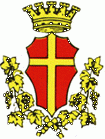|
 |
|

Bystander and main point city of Sicily with 270.000 inhabitants. Sets
on the narrow one that from it he/she takes the name to the feet of the
Peloritani Mountains in a bright scenery the sea and the verdant
mountains that give her an unique charm. Its history has ancient: you/he/she
was founded in the VIII sec. a.C. with the name of Zancle from farmers
Calcidesi. Subsequently it belonged to the Carthaginian ones, to the
Romans, to the Goths, to the Byzantines, to the Mussulmanis, to the
Norman ones, to the Svevis, to the Aragonese ones and finally to the
Borbonicis. For the wars and the earthquakes you/he/she has known more
times the destruction. After the 1908 terrible earthquake, you/he/she
was almost entirely reconstructed with roads wide and rectilinear and
ample plazas that give her a modern aspect. To see the Cathedral (native
of 1907, but more times reconstructed, on the splendid fašade of
particular note the Gothic portals), with the grandiose astronomic bell
tower that every midday offers the unusual show of the automatons in
movement. On the plaza there is the 1547 Orione Fountain, work of
Michelangelo from Montorsoli, considered the most beautiful fountain of
the '500 European. There is a little far the suggestive Church of the
SS. Announced of the Catalans, of Arab-Norman epoch (XII-XIII sec.). On
the overlooking piazzetta h posts the statue of Don Giovanni of Austria
(winning of the battle of Lepanto) of Andrew Calamech. Not distant there
are the ruins of the Church of Saint Maria Alemanna of the XIII sec.
what the most beautiful and important Gothic construction in Sicily was.
In the Regional Museum (Avenue of the Liberty) among the other works I
am her/it "Resurrezione of Lazzaro" and "The adoration of the shepherds"
(1609) of Caravaggio and the exceptional one "Madonna of the Rosary"
(1473) of Antonello from Messina. The visit in Messina cannot tell him
concluded without a walk along the Coast that conducts to the lakes of
Ganzirri and the attractive country of Tower Lighthouse, on the point of
the Head Peloro. |
|








